- Home
- W. Bruce Cameron
A Dog's Perfect Christmas Page 5
A Dog's Perfect Christmas Read online
Page 5
Hunter dropped his self-congratulatory grin when he saw Ello glaring at him. “Okay,” he offered reasonably, “why don’t you name some ways that your generation has it worse than any other generation in the history of the world, including the people in the Spanish Inquisition.”
Ello’s expression turned smug. “That’s simple. Cell phones.”
Hunter drove. He nodded. Silence sat with them in the car. He nodded some more. “You know what? That answer is so perfect I really just want to take some time to think about it.”
* * *
Ello saw Brittne speaking to Mourgen and marched up to the two of them, her face set in righteous indignation.
“You know what my dad just told me? Some new guy, some ozay kid from, like, Detroit, is moving here and my dad says I got to take him around school like I’m a seeing-eye dog or something, and I’m, like, gonna be stuck with this dweeby dude and he’ll probably think I’m his best friend, and then it will be impossible to get rid of him.”
This was the sort of scandal that attracted Brittne the way blowflies swarmed to a corpse. Ello waited expectantly for feigned horror, knowing Brittne would find the whole thing delicious. That’s who Brittne was. Gossip was her raison d’être. You put up with it because she was the richest, most beautiful, most popular girl in the school, and Ello’s Best Friend For Life.
But Brittne surprised Ello by not reacting much at all. She gave a slight uplift of her perfectly plucked eyebrow to indicate she had heard, but otherwise—nothing.
Mourgen sniffed. “Boring,” she pronounced.
Ello regarded Mourgen uncertainly, not sure why she was even here. Mourgen so obviously adored Brittne, wanted to be Brittne, that Brittne had shunned her for, like, ever, just (as far as Ello could tell) so Brittne could revel in the Power Of Brittne. The school had one queen and she decided who was in and who was out. Had Mourgen somehow been resurrected?
Ello turned to Brittne, trying to get a read on the situation, but the bland, contemptuous expression in her best friend’s eyes drained her of strength. Ello walked away with a nauseating clinch in her stomach, unsteadily heading back to her locker, feeling every eye in eighth grade watching her.
Something very bad was happening.
CHAPTER SEVEN
Winstead understood the significance of Daddy closing his book with a dry clap: it signaled that something was going to happen now. The dog decided to feign sleep—he was not in the mood to go back out into the yard. He heard the chair squeak as Daddy struggled up into a standing position, grunted, took a deep breath, let it out slowly.
“Hey, buddy, are you asleep?”
Winstead did not understand the question but didn’t hear anything promising a treat or a meal, so he remained motionless, eyes lidded.
“Come on, big guy. Let’s go out to the garage.”
Winstead couldn’t help himself; he raised his head as his person shuffled across the room, then jumped out of his dog bed when he heard the bedroom door open. His curiosity was simply irresistible, even though he was almost certain that Daddy was heading for the sliding doors to the backyard. Winstead would gladly go anywhere, but he wanted it to be with Daddy.
To Winstead’s surprise, the backyard was not the destination. Daddy moved through the kitchen and to the garage. Winstead stepped briskly now, eager to explore the exotic scents out there.
The lights came on and Daddy shut the door behind them. Winstead began sniffing around the base of the trash cans, turning when Daddy started pulling on a heavy canvas that made a loud rustling noise. As soon as the tarpaulin hit the floor, an odor, long familiar and musty, filled Winstead’s nostrils. He trotted over to the car and sat before the door expectantly.
For a long time, his person did nothing but just stand there. Finally, though, the car door opened and Winstead immediately bounded onto his place in the back seat. He settled his head on the doorframe. Sometimes there was a roof on this car, and sometimes there wasn’t. Right now, there wasn’t.
Daddy settled in behind the steering wheel and closed the door. “I could do that.… I could put a new engine in her,” he remarked. “Get her driving again.”
Winstead did not hear a single word he recognized. He sighed, looking forward to getting rolling. He had so many marvelous memories of this car. Car rides with Mommy and Daddy, the top open to the sky, exotic smells whistling into his muzzle at a provocative velocity. Sometimes Mommy would reach out and touch Daddy’s shoulder with a light hand. The gesture always made Winstead wag.
Most of the best smells had surrendered their hold on the interior air of the car. But Winstead could still sense Mommy, her scent worked into the leather seats and other gathered, tight places. Faint, yes, but Mommy was still here in this car.
Daddy said a few words, almost mumbling, and Winstead knew they were not directed at him. Not dog words. Perhaps Daddy was talking to Mommy because he smelled her too.
Winstead sighed, ready to get moving. He loved Daddy and he loved car rides.
And so he waited.
* * *
Hunter felt a flash of guilt as palpable as a sudden sweat when Juliana asked him if he had noticed that she’d decorated the home for Thanksgiving … because of course he hadn’t. He looked around wildly, and yes, the signs of the upcoming holiday were everywhere, from the turkey ornaments to the basket of orange gourds to the art-class sign that said WE GIVE THANKS, created by (third-grade) Ello out of what looked to be toothpaste on a piece of driftwood.
“Very pretty,” Hunter replied, knowing this wasn’t exactly an answer to her question.
“Is Sander coming out for dinner?” Juliana asked.
Hunter turned to his daughter. “Did you tell him about dinner?”
Ello nodded. “I told him, plus Garrett threw a plastic tomahawk into his room and I think it hit him.”
“Seems like sufficient notice,” Hunter observed.
“It was from the box of Thanksgiving decorations,” Ello continued. “The tomahawk symbolizes our oppression of native peoples. If there were any justice, we would all go back where we came from and leave the country to the people who were here first.”
“Okay,” Hunter agreed, “we’ll leave after dinner.” Ello gave him a dark, fuming glare as he stood up. “I’ll go talk to Dad.”
Hunter found his father watching television. Winstead was sprawled in his dog bed and didn’t react to Hunter’s arrival. “Hey, Dad. Are you coming to dinner?”
Sander aimed his remote at the television and snapped off his program with an odd sort of viciousness. “Can I just eat in here?” he demanded in a surly tone.
“Why?”
“The twins drive me crazy.”
“Of course, that’s what they’re for, to drive us crazy.”
Sander heaved a sigh, and a moment later Winstead followed suit. Hunter regarded his father for a long moment. “Hey, Dad, do you mind if I ask you a personal question?” he asked, surprising himself.
Sander addressed the query with a look that was neither inviting nor discouraging.
“Did you and Mom ever…” Hunter abandoned the sentence and started over. “I’m really worried that Juliana is thinking of leaving me.”
Sander stared at him as if he were speaking the language of the twins.
“She says she’s not happy,” Hunter continued, afflicted with the sudden urge to sob. He took a breath to tamp it down. “With the marriage, I mean. Except, when she talks, it seems like it’s really less the marriage than everything else. Like, the twins, and you, and just everything. I mean, she was a high-powered attorney, and now all she does is take care of dependent organisms. Of which I am one, right? But I have to work, and we have the twins. That’s not something I can change. But maybe she’s so fed up she’s just thinking the hell with it, she’d rather not be married.”
His father’s expression remained maddeningly opaque.
“She wants to go back to work, she said. More than anything, she said. And then she said
our current situation makes that impossible. I don’t know what to do,” Hunter confessed into the void.
Winstead sighed again. Hunter waited.
“Well,” Sander said at last, “what can you do? If she’s unhappy, she’ll leave.”
Hunter gazed at his father in disbelief. After a moment, he turned away. “Tell you what,” he tossed over his shoulder, “we’ll make a plate for you, and you come get it whenever you want. I really don’t care.”
* * *
Hunter rejoined his family. Juliana gave him a questioning look and he shrugged in reply. No words were necessary; her question and his answer were clear to both of them. Ewan said something and Garrett, giggling, seized a handful of Jell-O and squished it. Juliana reached out with a wet kitchen towel and expertly wiped away the gooey mess, moving from the boy’s fingers to his face. Sputtering, Garrett tried to escape what Hunter admired as effective negative reinforcement.
“Next time, maybe keep your hands off your food,” Hunter advised his son.
“Ewan told him to do it,” Ello volunteered.
“So, hey,” Hunter said to his daughter, “how was school today?”
It seemed an innocuous, routine question. But Ello’s face turned dark and she stared grimly at her plate. Hunter resisted the urge to order her to look at him. “Ello?” he prodded, with what he felt was benign patience.
“Brittne hates me,” Ello mumbled into her mashed potatoes.
Time for another husband-and-wife glance. Hunter’s position on Brittne had always been that she was an incurable affliction on his family. Being rid of Brittne meant, to him, that they should open champagne or bat a pinata. Hunter mulled over his response, finally deciding on, “Why do you say that?”
Ello continued to focus on her carbohydrates.
“Ello?” he prompted after a moment.
“I don’t want to talk about it!” she seethed, lasering him with a searing glare.
Hunter directed a glance at his wife that was equal parts helplessness and accusation. Ello had morphed into this sullen creature on Juliana’s watch; ergo, Juliana needed to fix this.
“If we had a dog,” Ello stated through clenched teeth, resurrecting their conversation from before, “then at least I’d have one friend in the world.”
Instead of reflexively denying his daughter, Hunter considered it. A dog would love him, would greet him when he came home, would sit and stare beseechingly at meals instead of burying its attention in a phone. Maybe a member of the generation that had it worse than any other generation in the history of the world would cheer up a little, smile every once in a while, if they had a dog.
He glanced at his wife, and Juliana’s expression was as unreadable as Sander’s had been. She had to know he was actively contemplating it, because she could read him perfectly, but she wasn’t sending back any signals. Was this some sort of test? If he agreed on a dog, would that be what broke up his marriage—the final injury, inflicted out of disregard? He was desperate to do whatever Juliana wanted, but how could he know what that was?
He pictured his wife feeding the dog, cleaning up its messes, giving it baths. Like a twin, but with the added ability to chew their footwear. That’s exactly what would happen, even if the pet technically belonged to Ello.
No, he decided. Not until things were back to normal with his marriage.
“Well,” he countered, “maybe you’ll make friends with Sean O’Brien.”
Ello recoiled in such disgust, it was as if the twins had just vomited on her. “Oh my God, Dad, you have no idea what it is like to be a teenager. Life sucks! This family sucks!”
Ello bolted from the room, nearly running over her grandfather as Sander made his way to the table.
“You shouldn’t let her behave like that,” Sander chided helpfully.
* * *
At school the next morning, Mourgen was standing in the front hallway as if she had been appointed as the welcoming committee.
Ello eyed her suspiciously. Long ago, Mourgen had gone all goth: black clothes, black lipstick, and a nose piercing she wasn’t allowed to wear in school. Now, though, she was back to dressing like Brittne: short skirt, nice sweater, a bracelet, and her hair blond—well, orange, really, the intended color unable to fully transition from ebony in a single application of bleach. Wait, is that Brittne’s sweater? Brittne only loaned apparel to her closest friends. In what twisted, parallel universe was Ello living now?
Mourgen even displayed the sweater like Brittne, her bony shoulders and thin torso showing off a waifish figure. She wore a sly expression, staring pointedly at Ello’s chest. “Hey, so, Ello. I hear you got your glow up, but you been hiding it all this time.”
“What? No,” she replied shakily. “Of course not.”
“Uh-huh.”
Flustered, Ello turned and walked away from Mourgen, so disoriented that it took her a moment to notice that the usual girls were not in the usual places. The hallway seemed oddly out of sorts, as if people had taken up surreptitious positions. She saw the shadow of someone darting into a doorway, and someone else lurking behind an open locker door, horror-movie style. Now what?
She opened her locker and shrugged off her coat. She grabbed a notebook and was about to slam the metal door when she spotted a thick envelope she had not put there. Glancing around and noting the deliberate lack of people surveilling her, Ello pulled out the envelope, which was lumpy inside. She opened the flap and out spilled a handful of photographs.
She instantly recognized them, because they were photographs of her.
They were the wallet-sized school photos that everyone exchanged at the beginning of school each year. There were smiling pictures dating all the way back to first grade, photos Ello had given to her friends over the years.
Someone had used pins to poke out all of the eyes.
With fingers trembling from quakes deep inside her stomach, Ello flipped over the first one, a fifth-grade picture, on the back of which her own girlish scrawl declared, “We will always be friends, Mourgen. Love, E.” There was one dedicated to Jayneigh, another from a different grade to Mourgen, and when she turned over the next one, she saw what she knew she would find: “To Brittne, my best friend forever. Love, E.”
Ello realized she was holding her breath, but when she sucked in a fresh lungful of air, she still couldn’t breathe. She stuffed the wretched pictures back in their envelope and tossed it into the depths of her locker. She grabbed her coat, forehanded the door, and nearly ran for the principal’s office, narrowing her peripheral vision so as to catch no one’s eye.
CHAPTER EIGHT
What stuck with Juliana, what visited her at night like a ghost from the attic, was the expression on Hunter’s face when she’d told him she wasn’t happy in their marriage. She could see the words landing like body blows. Once they came out, there was no putting them back in, but now Juliana had different words.
A senior partner at Juliana’s former law firm had a term for what she had done—he called it a “Gong Bong.” It happened when something slipped out in court that the jury, regardless of the judge’s instructions, could not ignore, could not unhear. Those words lingered in the air like the resonating bong from a gong struck with a soft hammer.
She’d planned to drop the Gong Bong—“unhappy in our marriage”—only if Hunter had reacted insensitively to her pain. But instead she had done it in response to his irritating, can-do optimism. There was nothing here for him to fix. She simply needed him to understand.
“You were wrong,” Juliana lectured herself in the minivan after dropping the boys at preschool. “Your happiness is not Hunter’s responsibility.”
At home, she continued the conversation with herself.
“So, now, here you are, in the middle of the day, running a bath.” Her list of chores was facedown on the kitchen counter to silence it. Juliana watched the water as it pounded into the tub, a bath bomb in her hand. She felt chilled and achy and a bit nauseated. In truth, it felt
a little like being pregnant, which was impossible. “You can’t be,” she told herself. “I mean, sometimes birth control fails, but isn’t that human error? You’d never make that mistake.”
She took a breath, considering. It wasn’t as if their schedules afforded a lot of time for that.…
“But there were a few nights, maybe five or six weeks ago … When did you have your last period?” Her expression became wistful. “You should call Mom,” she whispered.
Her mother shared Juliana’s habit of speaking out loud and at length to herself. Juliana remembered when she was about Ello’s age and she heard her mother say, “Estou grávida.” I’m pregnant. Talk about Gong Bongs.… The young Juliana had thought she’d love her baby brother—and she did, when he was a baby and she was a big sister. Then he became a toddler and she became a babysitter. She understood perfectly why Ello eyed the twins with such distrustful loathing.
Juliana glanced at her watch, calculating the difference between Eastern Standard Time and Brasilia Time. It was just past noon there. Her mother would be in the kitchen, talking to herself while waiting for her husband to come home for the midday meal.
As if anticipating being used, Juliana’s cell phone rang, skating a little across the slick surface of the countertop. She snagged it and saw it was Ello.
“Mom,” her daughter greeted, “can I come home?”
Ello’s voice was strangely tremulous, her normal life force extinguished, and Juliana was instantly alarmed. “What’s wrong?”
“I’m sick.”
“Sick? Do you have a fever, a headache, are you sick to your stomach?”
“Mom, please.”
It went straight to her heart, that plaintive voice, her little girl asking for a mother’s help. Juliana turned off the bath. “Okay, sweetie. I’ll be right there.”
Juliana walked down the hall to advise Sander she was leaving, but he was lying faceup on his bed, his arms across his chest, pale as a corpse in a casket. Winstead thumped his tail once but otherwise didn’t react to her appearance, the pair of them a study in motionlessness. Juliana sighed and headed for her car.

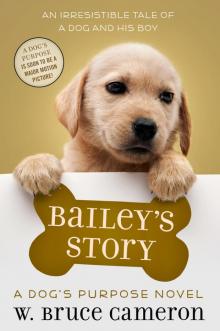 Bailey's Story: A Dog's Purpose Novel
Bailey's Story: A Dog's Purpose Novel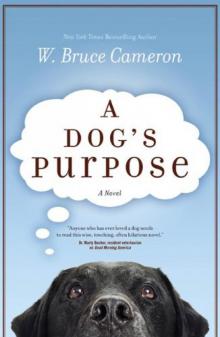 A Dog's Purpose
A Dog's Purpose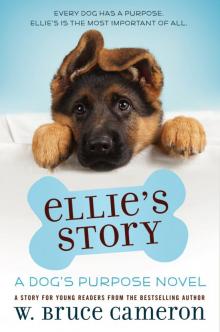 Ellie's Story
Ellie's Story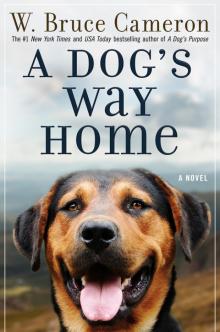 A Dog's Way Home
A Dog's Way Home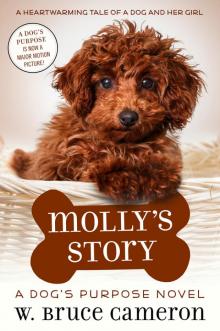 Molly's Story
Molly's Story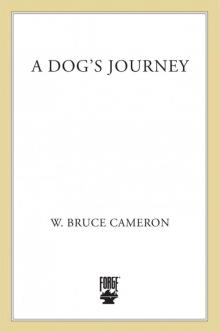 A Dog's Journey
A Dog's Journey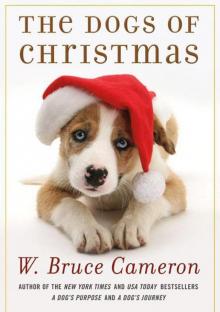 The Dogs of Christmas
The Dogs of Christmas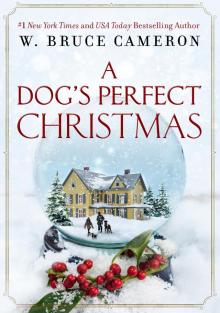 A Dog's Perfect Christmas
A Dog's Perfect Christmas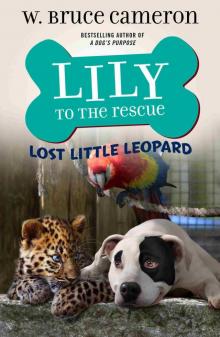 Lily to the Rescue: Lost Little Leopard
Lily to the Rescue: Lost Little Leopard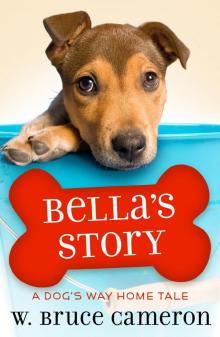 Bella's Story
Bella's Story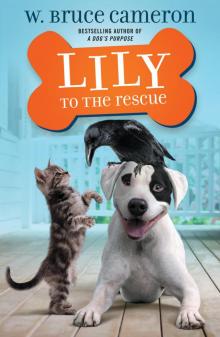 Lily to the Rescue
Lily to the Rescue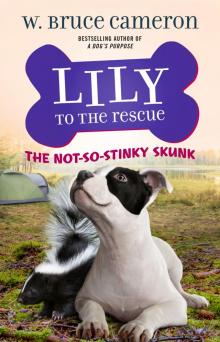 Lily to the Rescue: The Not-So-Stinky Skunk
Lily to the Rescue: The Not-So-Stinky Skunk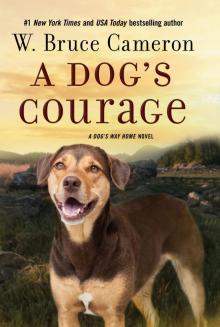 A Dog's Courage--A Dog's Way Home Novel
A Dog's Courage--A Dog's Way Home Novel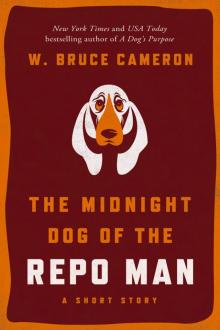 The Midnight Dog of the Repo Man
The Midnight Dog of the Repo Man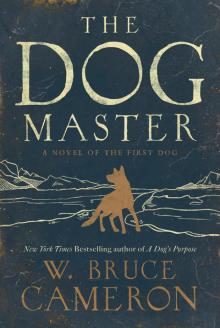 The Dog Master: A Novel of the First Dog
The Dog Master: A Novel of the First Dog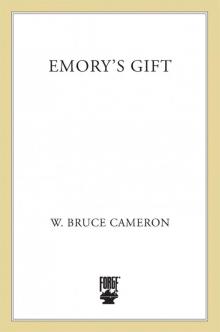 Emory's Gift
Emory's Gift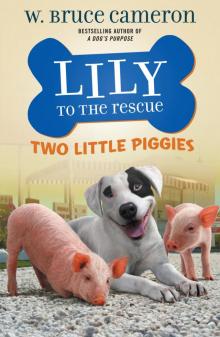 Lily to the Rescue: Two Little Piggies
Lily to the Rescue: Two Little Piggies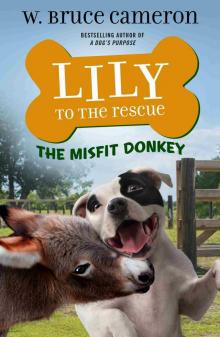 Lily to the Rescue: The Misfit Donkey
Lily to the Rescue: The Misfit Donkey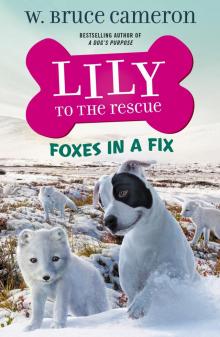 Lily to the Rescue: Foxes in a Fix
Lily to the Rescue: Foxes in a Fix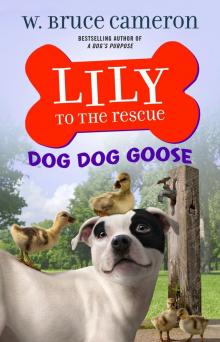 Lily to the Rescue: Dog Dog Goose
Lily to the Rescue: Dog Dog Goose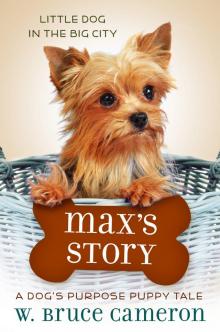 Max's Story
Max's Story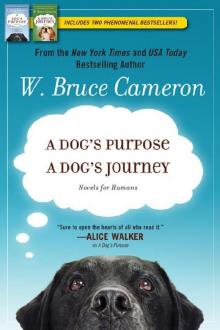 A Dog's Purpose Boxed Set
A Dog's Purpose Boxed Set Toby's Story
Toby's Story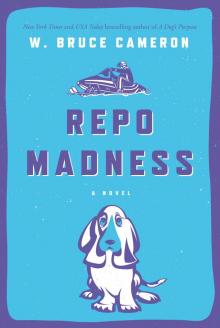 Repo Madness
Repo Madness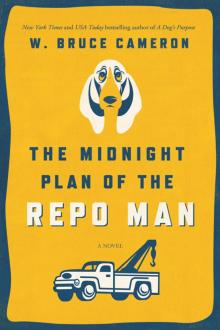 The Midnight Plan of the Repo Man
The Midnight Plan of the Repo Man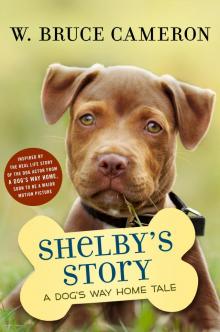 Shelby's Story
Shelby's Story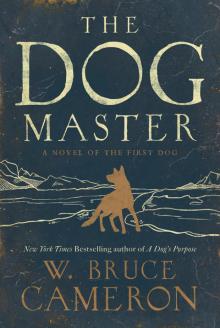 The Dog Master
The Dog Master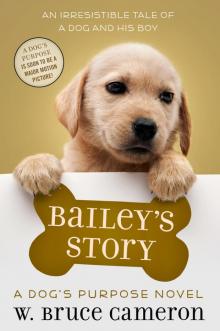 Bailey's Story
Bailey's Story